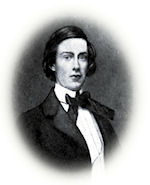
Headquarters 2d Brigade, S. C.
Beaufort, S. C. Dec. 20th, 1861.
My dear Mother:
Here it is almost Christmas, but there is no hope of dining with you all at home on that joyful day. Still I will try to make myself cheerful here, as that alone is a comfortable philosophy. Duties are a bit lighter to-day—the result, I suppose, of great exertion for a few days back. I received last night three letters from you and one from Horace. Let me thank you, dear mother, very much for the photograph you sent me. It gives me much gratification, and now occupies a conspicuous place in my room. I shall look impatiently for the photographs likewise of my sisters and the little boys. It would do me much good to see Hunt’s good-looking face, if he does feel too logy to favor my whims. You write me for my photograph, as though I was living at the seat of civilization, and the abode of elegance. Well, to be sure, I am; but then everything is in Southern style, which does not admit of such vulgar things as tradesmen, much less of itinerant shadow catchers. I have grown immensely aristocratic since in South Carolina. There is something in the air that’s infectious. A few more weeks here, and I’ll be able to stomach even a Bostonian, which — Oh! I had almost forgotten how soon Hall’s wedding comes off; the 25th of December, Walter writes me. Do for Heaven’s sake give the bride something from me. I enclose $10.00 to make the purchase. There is nothing one can possibly buy down here. Pay-day is not far off again, and I hope to be able to remit something handsome to Uncle Phelps, which may make him cry, “Oh, provident youth!” Until then Walter’s baby must go without the coral and bells destined him by his affectionate Uncle William. Tell Horace I took into consideration the request he made with regard to writing a few lines to Saml. Lord, assuring him of the welfare of Miss Mintzing, concluded to do it, have done it, and think the communication will reach him.
We are quite active here at Beaufort, giving the good people on the mainland all sorts of starts. The other night a young Lieutenant crossed to the mainland with a small party, caught six of their pickets, and brought them safely back as prisoners. A captain takes a boat, glides along the shore, gets fired upon, returns the fire, and, it being his first fight, he has the agreeable sensation of seeing the enemy run. The fact is, though the people of respectability are many of them rampant, the poor whites think the war a hard thing, which they do not like to bear. So much we gathered from the prisoners taken the other night. They say that all who do not volunteer are drafted into the army, and the difference made is, that volunteers receive $25.00 for clothes, and are treated with respect, whereas drafted men get nothing but abuse. Therefore it is not difficult to see how popular volunteering must be in the South.
You will be pleased to hear that my friend William Elliott has gained perhaps the most brilliant reputation for cool courage and daring, of any man in the Army down here. He is a rare hero, and is bound to make his mark.
Give my best love to all, dear mother.
Affec’y.,
Will.










